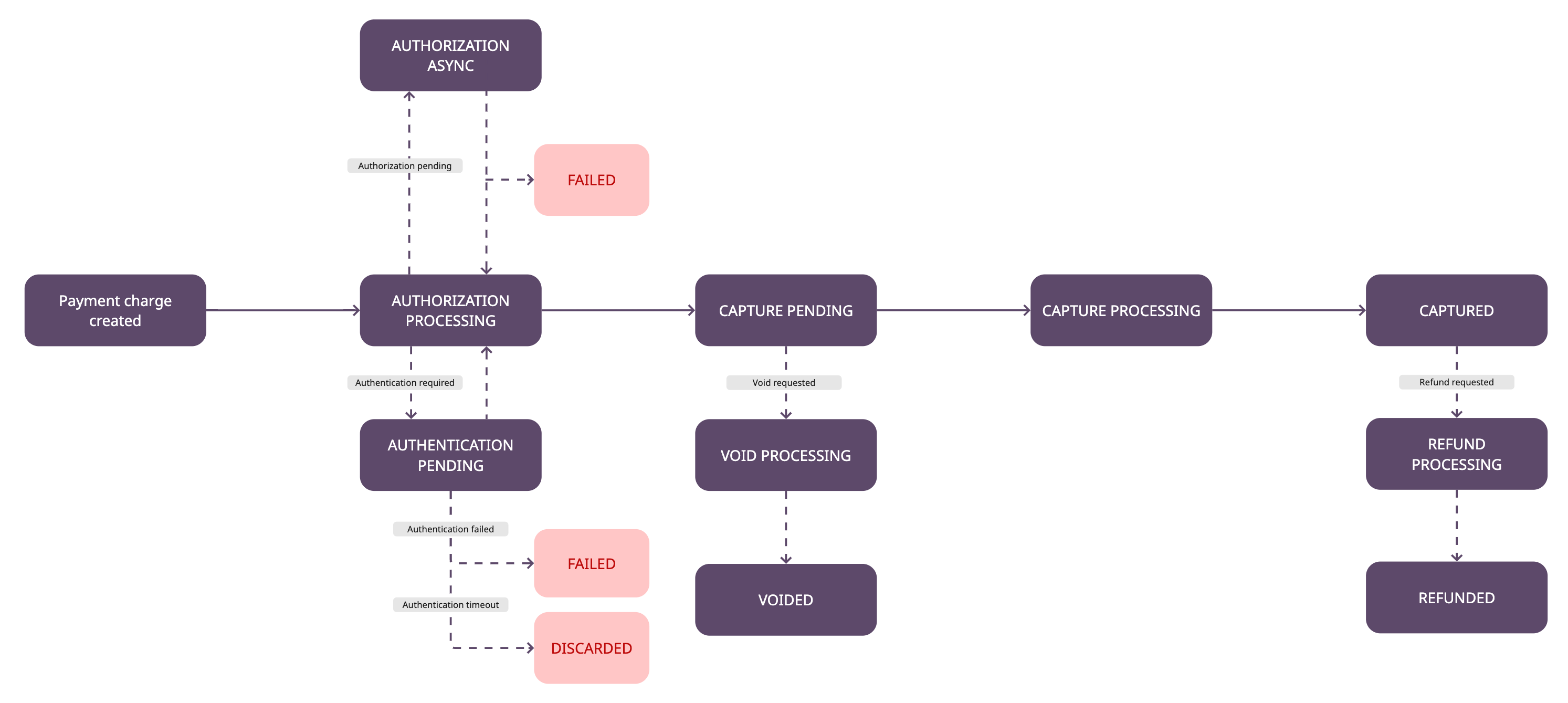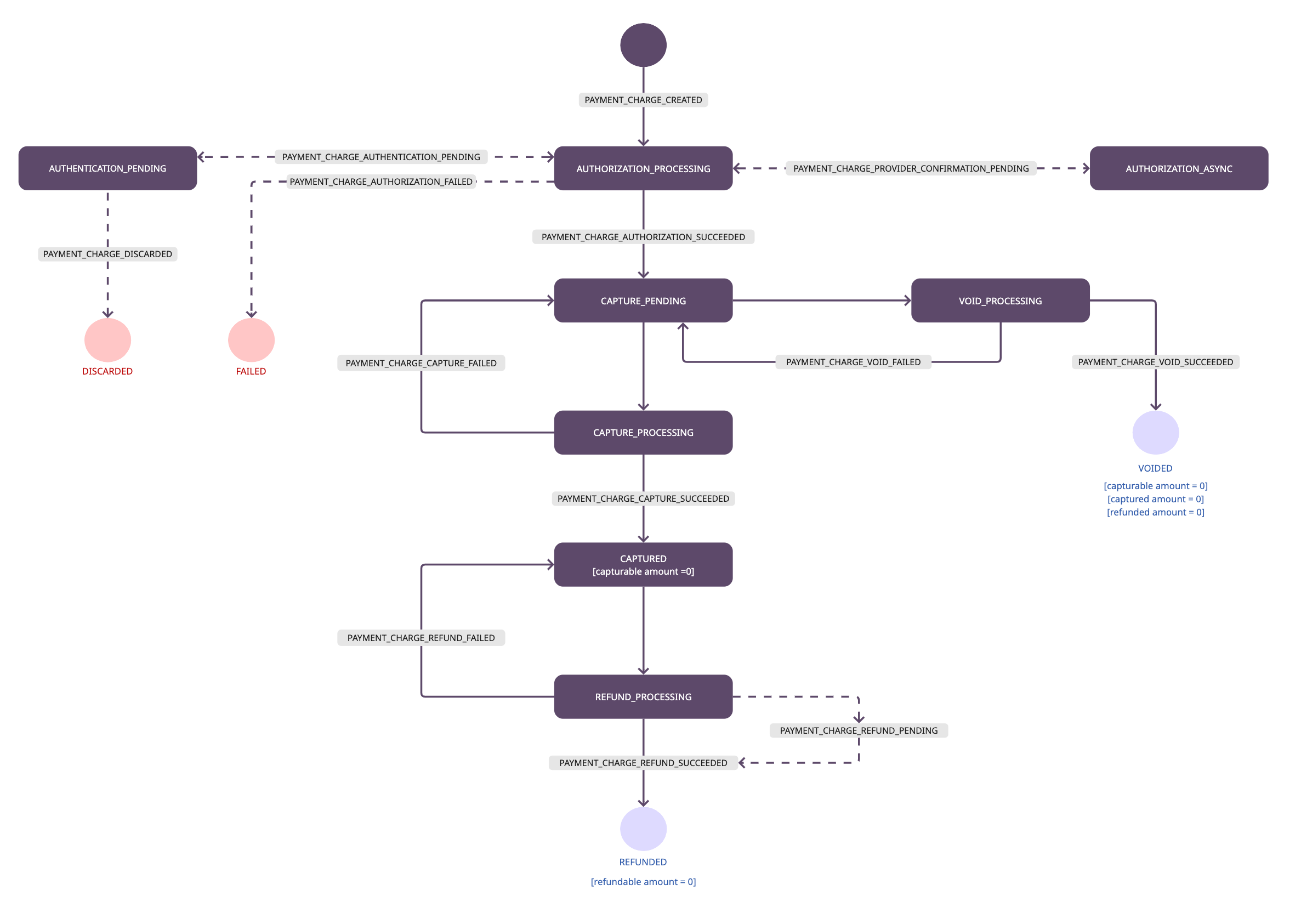Payment charge
A payment charge represents a single payment initiated by the merchant and completed by the consumer through a specific payment provider, scheme, or network.
A payment charge requires essential information, including the payment method, amount, currency, and consumer details. It then follows a lifecycle that represent the stages of payment processing:
- Payment authentication (if required by the scheme or network)
- Payment authorization
- Void
- Capture
- Refund
Payment charge lifecycle
Discover the different payment charge statuses:

- AUTHORIZATION_PROCESSING The initial status when a payment charge is created. Payment authorization is a crucial step in the payment process, it's when the scheme or network confirms funds are available and approved to be used for the purchase.
From this status the payment charge can move toAUTHENTICATION_PENDING,AUTHORIZATION_ASYNC,CAPTURE_PENDING,CAPTURE_PROCESSINGorFAILED.
PROCESSING states are temporary and should only persist while a processing request is in progress.
- AUTHENTICATION_PENDING This status applies to payments that require consumer authentication. You'll receive a list of standard
authenticationMethods[]that can be used to authenticate the consumer.
From this status the payment charge can move toAUTHORIZATION_ASYNC,CAPTURE_PENDING,CAPTURE_PROCESSING,DISCARDEDorFAILED.
- AUTHORIZATION_ASYNC For the majority of payment methods, authorizations occur in real-time and the outcome can be immediately shared with the consumer.
Some payment methods are unable to confirm the availability of funds or guarantee settlement until later in the payment process. These payment charges will transition toAUTHORIZATION_ASYNCuntil further notice is received from the scheme or network.
From this status the payment charge can move toCAPTURE_PENDING,CAPTURE_PROCESSINGorFAILED.
- CAPTURE_PENDING Capture refers to the process where the merchant formally requests to transfer the funds from the consumer’s account to complete. Not all payment methods support captures and will automatically transition to
CAPTURED. This step can also be automated through theautoCaptureparameter.
From this status, the merchant can also void a pending capture.
- CAPTURE_PROCESSING The capture request is either in progress or has been simulated because the payment method does not support it.
PROCESSING states are temporary and should only persist while a processing request is in progress.
- CAPTURED The payment charge has been successfully captured.
- DISCARDED The consumer did not complete the authentication process in time, and the payment charge has been discarded. This is a final status, a new payment charge must be created if you wish to proceed with the payment.
- FAILED The authentication or authorization was rejected by the scheme or network. This is a final status, and a new payment charge must be created if you wish to proceed with the payment.
- VOID_PROCESSING A request to void the pending capture has been submitted.
PROCESSING states are temporary and should only persist while a processing request is in progress.
- VOIDED The pending capture is now voided. This is a final status, it cannot be reversed and the payment charge can no longer be captured.
- REFUND_PROCESSING A request to refund the captured payment has been submitted.
PROCESSING states are temporary and should only persist while a processing request is in progress.
- REFUNDED The payment charge is now refunded (in full) and funds returned to the consumer. This is a final status, it cannot be reversed.
State machine
The following diagram shows a payment charge's different states, along with transition conditions and events.

Updated 5 months ago